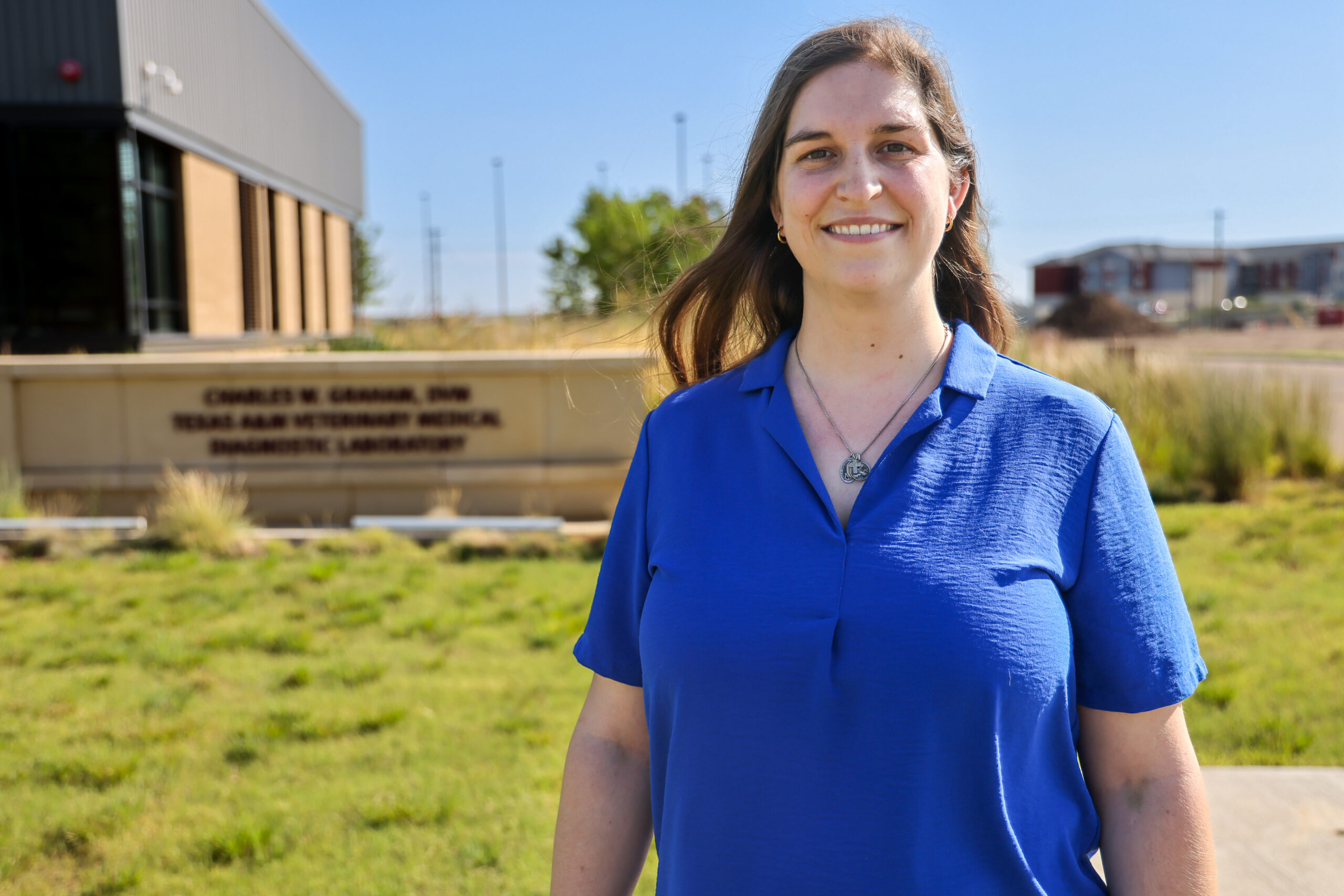Thompson named Texas A&M Veterinary Medical Diagnostic Laboratory Canyon resident director
Veterinary diagnostician to continue service to animal agriculture in new role
The Texas A&M Veterinary Medical Diagnostic Laboratory, TVMDL, has named Alexis Thompson, DVM, Ph.D., DACVPM, resident director at the Charles W. “Doc” Graham ‘53 DVM laboratory in Canyon. She will begin her new role Sept. 1.
As resident director, Thompson will oversee all aspects of the lab’s testing efforts, which contribute over 111,000 tests to TVMDL’s annual test volume. In addition, the Canyon lab services key livestock and agricultural industries throughout the Panhandle region and statewide.

“I couldn’t be happier to announce that Dr. Thompson will serve as TVMDL Canyon’s resident director,” said Amy Swinford, DVM, DACVM, TVMDL director. “She’s been doing an outstanding job helping our dairy clients navigate the unprecedented findings of avian influenza in dairy cattle. The leadership she’s demonstrated to our clients and to our Canyon laboratory staff has proven she is a natural fit for her new role.
“I’m confident that with Dr. Thompson’s expertise and training in epidemiology and diagnostics, she’ll identify new opportunities for expanding our services to better serve the needs of Panhandle animal industries, animal owners and veterinarians.”
Service to the Texas Panhandle
Thompson joined the agency last year as the lab’s food animal veterinary diagnostician. Since then, she has been an integral part of the veterinary community in the Texas Panhandle and has worked diligently to serve TVMDL’s large animal clients.
Most recently, Thompson was part of the core group of state veterinary medical professionals whose work led to the discovery of highly pathogenic avian influenza in dairy cows in the Panhandle.
Following a string of clinically ill dairy cows, Thompson and other state animal health officials worked to develop an official case definition and testing protocol. This information was used across the country to assist dairy producers as the virus, unknown at the time, spread across state lines.
Thompson relied on her epidemiology expertise to track critical animal health data that aided in the eventual detection of avian influenza. She has continued to work alongside dairy producers and veterinarians to ensure the health of cows in the wake of the avian influenza outbreak.
In addition to her efforts to support the dairy industry, Thompson and the Canyon lab assisted livestock and animal owners with diagnostic testing following the wildfires that devastated the region earlier this year.
“Throughout my time as a diagnostician, I have been fortunate to work closely with the Panhandle community,” Thompson said. “I have learned and struggled with the dairy community through the influenza outbreak and observed the resilience of the community following the recent fires. I am incredibly honored to serve amongst such an excellent group of livestock and animal owners.”
Continuing a commitment to disease detection
Although the Canyon lab’s clientele is diverse, efforts mostly support those across the agricultural industry. Testing services are offered to a wide range of clients including small, independent producers in addition to some of the largest animal agricultural companies in the world. Additionally, much of the testing performed at the Canyon lab directly supports the 10 million-plus cattle situated in the Panhandle.
“We provide superior testing services that aid in disease detection and prevention,” Thompson said. “Our efforts help maintain the health, integrity and security of our animal populations and food supply. I am excited to continue our commitment to serving the industries that feed our world.”
In 2015, Thompson earned a bachelor’s degree in animal science from the University of Kentucky. She earned a Doctor of Veterinary Medicine degree in 2019, completed a residency in Population and Preventive Medicine in 2022, and earned her doctorate in 2023, all from Mississippi State University. In 2023, she also earned a board certification in preventive medicine and an additional certification earlier this year in epidemiology from the American College of Veterinary Preventive Medicine





